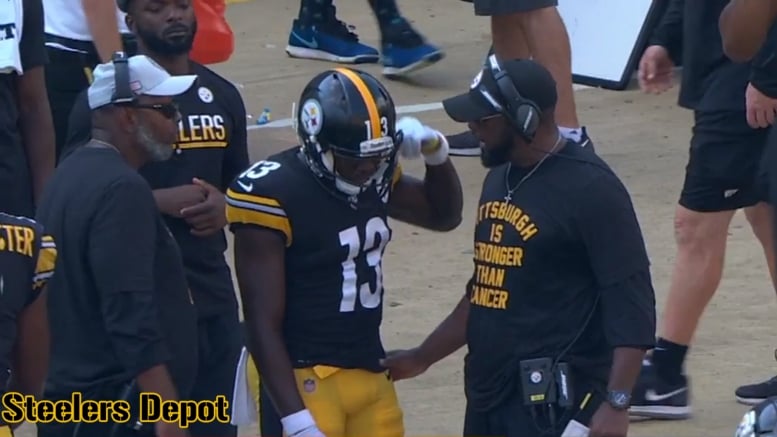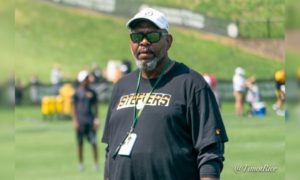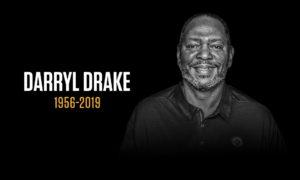I think it’s reasonable to acknowledge that the majority of us—NFL fans, generally, and Pittsburgh Steelers fans in particular—are not of a broadly marginalized class. Going out on a limb, my expectation is that the vast majority of our contributors, and regular commenters, are straight cis white men, including myself.
In that, we never grew up experiencing the same sort of systemic racism, whether passive or otherwise, that we continue to see in practice today, and which defined the adolescence and young adult experiences of many African-Americans and people of color.
This is an important conversation to have because it’s one that affects a great deal of the population of players of the National Football League. And I’m talking about it today because it was a topic of conversation that was also important to the late Darryl Drake, the Steelers’ wide receivers coach, who passed away suddenly yesterday.
Drake, 62, spent a life in football. An undrafted free agent out of Western Kentucky in 1979, he struggled to stick to any roster in the NFL or the CFL, to the point where by 1983 he had returned to his alma mater to initiate a long and storied coaching career at the age of 26.
By 1985, he graduated to wide receivers coach from graduate assistant for Western Kentucky, serving different roles for the school through the 1991 season before moving to Georgia, where he would go on to coach Hines Ward for the Bulldogs.
In 1997, he would serve as the offensive coordinator and quarterbacks coach of the Baylor Bears before returning to coach wide receivers at Texas the following year. He first broke into the NFL coaching ranks at the age of 47 in 2004 with the Chicago Bears, where he would coach Brandon Marshall to some of his best seasons, and then Larry Fitzgerald in a late-career renaissance for five seasons with the Arizona Cardinals before finally joining the Steelers in 2017.
By 62, he understood that his window for upward mobility had long closed. He would always remain a position coach, and he was likely content with that role, though not the circumstances that kept him from transcending it, had he so desired. And he wanted more in terms of opportunities for others like him—other coaches of color.
Over the last two cycles of head coach hirings, for example, 15 jobs have opened up, and only two of them went to coaches of color, one of whom, Steve Wilks, was fired after one season—replaced by a college football coach who was fired following several losing seasons, and who had no prior NFL coaching experience.
This did not go unnoticed by the coaches of color around the National Football League, and this ultimately convened into the Quarterback Coaching Summit in June, hosted jointly by the NFL and the Black College Hall of Fame.
The two-day summit gathered dozens of coaches of color between the college and NFL ranks to speak about the current state of the game and their roles in it. Drake was among the participants, and here is what he had to say, from Jim Trotter:
If we don’t speak out, then we’re running down that same railroad track, and that track is rusty. There are so many qualified minority coaches, which is why the reaction among them is not good. A lot of guys felt slighted in this last hiring cycle; a lot of guys do not know which road to take to get their names in a position to where they can have those opportunities; a lot of guys felt like certain individuals that should have had opportunities to get a job did not get a job.
There are currently only four head coaches of color in the NFL, which is tied for the lowest total at any time since the Rooney Rule took effect. Ozzie Newsome became the first minority general manager in 1989. He was the only one until 2002, and after he stepped down following the 2018, there is now only one once again. Many resent the need for the ‘token interview’ with a minority candidate, but many qualified minority candidates continue to be passed up for even those.
Newsome himself was also in attendance at this summit in June, and he exposed part of the problem himself. “I didn’t know there were this many African-Americans coaching quarterbacks”, he said. “It was a lack of awareness on my part. I had no idea. But I will be taking this back to Baltimore with me”.
The issues concerning qualifications and opportunities for advancement among minority coaches are multiple, and widely discussed. It often draws controversy when it comes up, because people don’t want to talk about it, or acknowledge it.
But the fact is that there are many problems in the pipeline for minority coaches. The Quarterback Coaching Summit in June was formulated to try to address that. As it would turn out, it may end up being one of the final pieces of Drake’s legacy in the game to which he gave his life, literally to his last breath.








